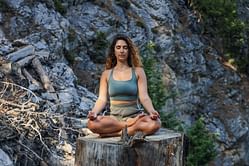Yoga has been around for centuries, and its popularity has risen in recent years. There are many different types of yoga, each with its own benefits. Yoga is beneficial for both the mind and body. It can improve mental well-being, increase flexibility and strength, and reduce stress. Yoga also improves physical health, including reducing blood pressure, improving heart health, and helping reduce chronic pain. One of the main benefits of yoga is that it helps reduce stress by promoting relaxation and reducing the levels of the stress hormone cortisol.
What is yoga?
Yoga is an ancient practice that originated in India. It is a form of exercise that involves physical, mental, and spiritual aspects. The physical part of yoga is called Hatha yoga, which includes the practice of asanas (yoga poses) and pranayama (breathing exercises). The mental part is called Raja yoga, which includes the practice of meditation and mindfulness. The spiritual part is called Bhakti yoga, which includes devotional practices such as chanting and singing.
What are some benefits of yoga?
Yoga is a mind-body practice that combines physical poses, controlled breathing, and meditation or relaxation. Yoga can help you improve your flexibility, strength, and balance. It can also help you manage stress, improve your mood, and boost your energy levels. Here are some of the most common benefits of yoga:
1. Improves flexibility
Yoga involves a lot of stretching, which can help improve your range of motion and flexibility.
2. Builds muscle strength
Yoga builds muscle strength because it requires the body to use muscles to maintain balance in various positions. In order to maintain balance, the muscles must generate enough force to counterbalance the pull of gravity. Over time, the muscles adapt to the demands of yoga and become stronger.
3. Perfects your posture
Many of the poses in yoga can help improve your posture. Yoga perfects your posture by lengthening and realigning your spine, which in turn decompresses your vertebrae and relieves pressure on your discs. Additionally, yoga strengthens the muscles that support your spine and improves your overall balance.
4. Helps you focus and concentrate
The breathing exercises you learn in yoga can help you focus and concentrate. Yoga can improve focus by teaching people how to control their thoughts and be present in the moment. The physical practice of yoga also calms the mind and body, which can make it easier to focus on tasks. Scientific research has shown that yoga can improve focus and attention by increasing brainwave activity in the frontal lobe, which is responsible for executive functioning.
What happens if you do yoga every day?
Different people may experience different benefits from practising yoga every day. Some possible benefits that have been associated with regular yoga practice include improved flexibility, increased strength and muscle tone, improved respiration and circulation, improved mental clarity and focus, and reduced stress levels.
What are the disadvantages of yoga?
Some of the possible disadvantages of yoga are listed below.
1. It can be difficult to find the time to commit to regular yoga practice.
2. You may feel awkward or self-conscious at first if you are not used to the poses.
4. You may feel soreness in your muscles after a yoga session.
5. You may not see results immediately, which can be discouraging.
How quickly does yoga change your body?
A study conducted in 2014 found that just eight weeks of yoga can improve flexibility, muscular strength, and endurance. The study involved 42 men and women who were divided into two groups. One group participated in a regular yoga program, while the other group did not. The results showed that the yoga group had significantly increased their flexibility, muscular strength, and endurance compared to the non-yoga group. They also had a decrease in body fat percentage and an increase in lean muscle mass.
Eight weeks of yoga can lead to significant changes in your body.
What should be avoided during yoga?
During yoga, one should avoid eating a heavy meal as it may cause discomfort. One should also avoid drinking alcohol as it may interfere with one's ability to balance and focus.
How long should yoga last?
It depends on the individual's goals and needs. Some people may only practise yoga for a few minutes, while others may practise for an hour or more. You may start with 20 to 30 minutes of yoga and gradually increase the time period.
What happens if I stop doing yoga?
If you stop doing yoga, your body will slowly return to its previous state. Your muscles will weaken and your flexibility will decrease. However, it does not contribute to any harm.









